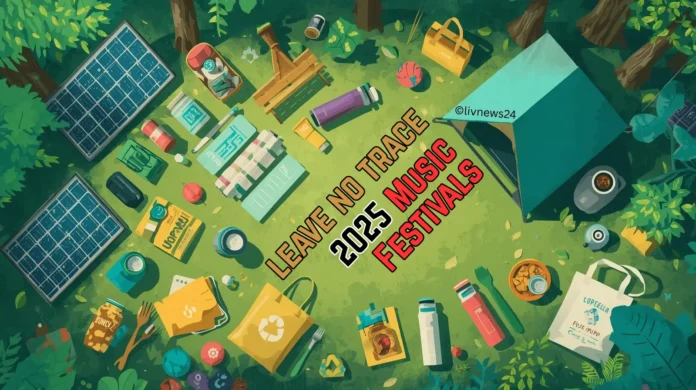Headed to a music festival? This zero-waste survival guide shows you exactly what to pack, how to eat and camp sustainably, and how to leave no trace—while still having a fantastic time.
Music festivals are magical experiences that bring people together through incredible music, vibrant energy, and shared passion.
However, they can also generate significant environmental waste.
This comprehensive guide will empower you to enjoy your festival experience while minimizing your ecological footprint.
Why go zero-waste at festivals?
Festivals are magical; however, they generate over 53,000 tons of waste yearly, with events like Coachella producing 1,763 tons and low recycling rates.
Consequently, choosing reusable items and implementing more effective waste management systems is crucial for the well-being of wildlife, waterways, and our wallets.
Moreover, many festivals now offer water refill points, deposit-return cup programs, and clearer sorting stations, making low-waste choices significantly easier than they were even a few years ago.
Planning Your Zero-Waste Festival Adventure
1. Transportation: Reduce Your Carbon Footprint
Travel smarter: Firstly, consider coordinating a carpool or using public transit to reduce emissions and alleviate parking congestion.
Many events even incentivize ride-sharing.
- Firstly, Organize a carpool with friends to reduce individual vehicle emissions.
- Secondly, Use public transportation when possible.
- Then, Consider cycling to the festival if feasible.
- Look for festivals offering carpool incentives.
2. Packing Essentials: Your Zero-Waste Toolkit
Choose reusables and deposits: Increasingly, bars are implementing reusable cup deposit systems, where you can return your cup for a refund or swap it for a clean one.
Similarly, some events have campsite recycling deposits that nudge everyone to sort properly so participate and get that refund.
Hack your meals: Because packaging drives waste, prioritize handheld or minimally packaged foods, bring small containers for leftovers, and skip condiment sachets by using shared stations or refillable.
Set up a zero-waste camp: Straightaway, make sorting easy: a recycling bag, a food-scrap bin (if the site offers composting), and a landfill bag plus clear signage for your crew.
Hydration and Drinking
- Bring a reusable water bottle with a built-in filter.
- Pack a reusable coffee cup for hot beverages.
- Carry a collapsible cup or reusable pint glass for alcoholic drinks.
- Bring an aluminum straw for an eco-friendly sipping experience.
Dining and Food Management
- Pack reusable Tupperware for food vendors.
- Bring a compact cutlery set (preferably bamboo or stainless steel)
- Use cloth napkins instead of disposable options.
- Carry refillable condiment bottles.
- Opt for bulk snacks in reusable containers.
3. Personal Hygiene: Stay Fresh, Stay Green
Toiletry Recommendations
- Use bamboo toothbrushes
- Pack shampoo bars and solid toiletries.
- Bring eco-friendly wet wipes or reusable cloth wipes for a more sustainable option.
- Carry dry shampoo or natural alternatives, such as cocoa powder.
- Use eco-glitter made from plant cellulose.
Hygiene Hacks
- Bring a quick-dry towel.
- Pack baby powder for sweat and odor control.
- Include hand sanitizer in a refillable container.
- Pack extra clean socks and undergarments.
4. Clothing and Accessories
- Choose second-hand or sustainable clothing.
- Organize a clothing swap with friends before the festival to save money.
- Bring a reusable rain jacket or cagoule instead of disposable ponchos.
- Pack layers for temperature variations
5. Waste Management Strategies
At Your Campsite
- Set up clearly marked bins for:
- Trash
- Recycling
- Compostable items
- Bring resealable bags for dirty or wet items.
- Pack all your waste out with you.
- Do not abandon your tent – take it home or donate it.
6. Additional Zero-Waste Tips
- Use reef-safe sunscreen without microplastics.
- Bring minimal packaging for all items.
- Choose multi-purpose products
- Support festivals with strong sustainability initiatives
Advanced tips for organizers
If you help with a camp or organize events, then level up with proven tactics.
- Map material flows: Firstly, start with a Material Flow Analysis to identify everything entering and leaving the site; design circular loops for items such as cups, plates, staging, décor, and even cooking oil.
- Set clear vendor rules: Ban single-use plastics; instead, require compostable or reusable ware, and also train vendors on proper waste disposal.
- Design for convenience: Place clear sorting stations near stages, bathrooms, and food courts; meanwhile, assign a green team to prevent contamination.
- Use incentives: Deposit/refund systems, meanwhile, greatly boost participation and diversion rates.
- Track and share metrics: Aim for 90%+ diversion through recycling, compost, and reuse; similarly, top events reach this with reusables, dishwashing, and real-time education.
- Plan donations: Aim for 90%+ diversion through recycling, composting, and reuse; likewise, top events achieve this with reusables, dishwashing, and real-time education.
- Publish a zero-waste guide: Even small local festivals succeed by formally adopting “reduce–reuse–recycle–recover” checklists for staff and volunteers.
Your Festival-Your Environmental Impact
Every small action counts; by embracing zero-waste strategies, you not only enjoy the festival but also inspire others and protect the planet.
After the last set: leave no trace
Before you crash or head out, thoroughly sort your campsite.
Then, take your gear home (no abandoned tents!), return any deposit items, and consider donating unopened food to community groups when facilities are available.
Furthermore, snap a “clean site” photo to keep yourself accountable.
In short, a low-waste festival isn’t about perfection; it’s about planning, choosing reusables, and most importantly participating in the systems your festival provides.
With an innovative kit and intention, you’ll save money, feel better, and ultimately keep the grounds as joyful as the music.



